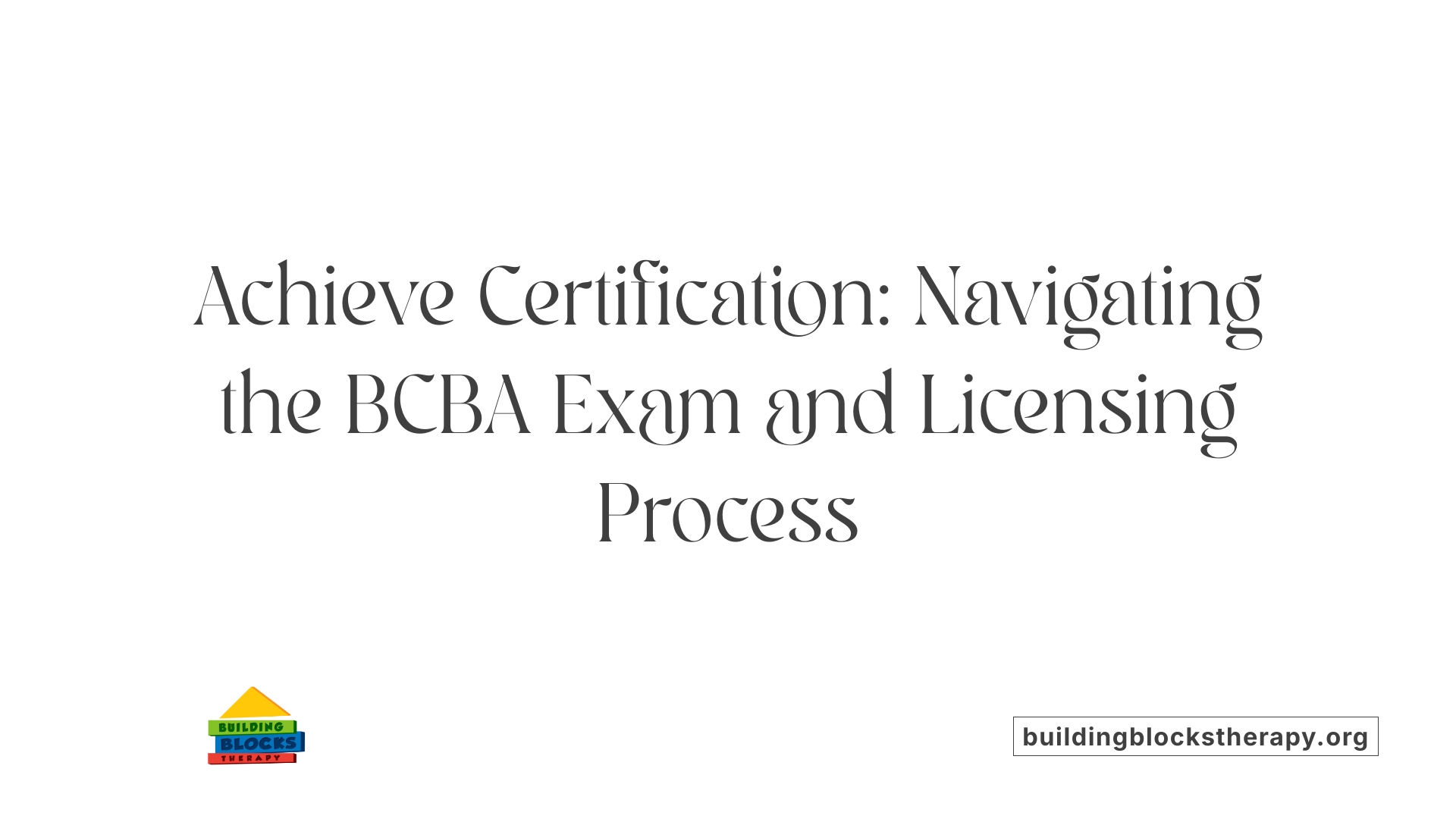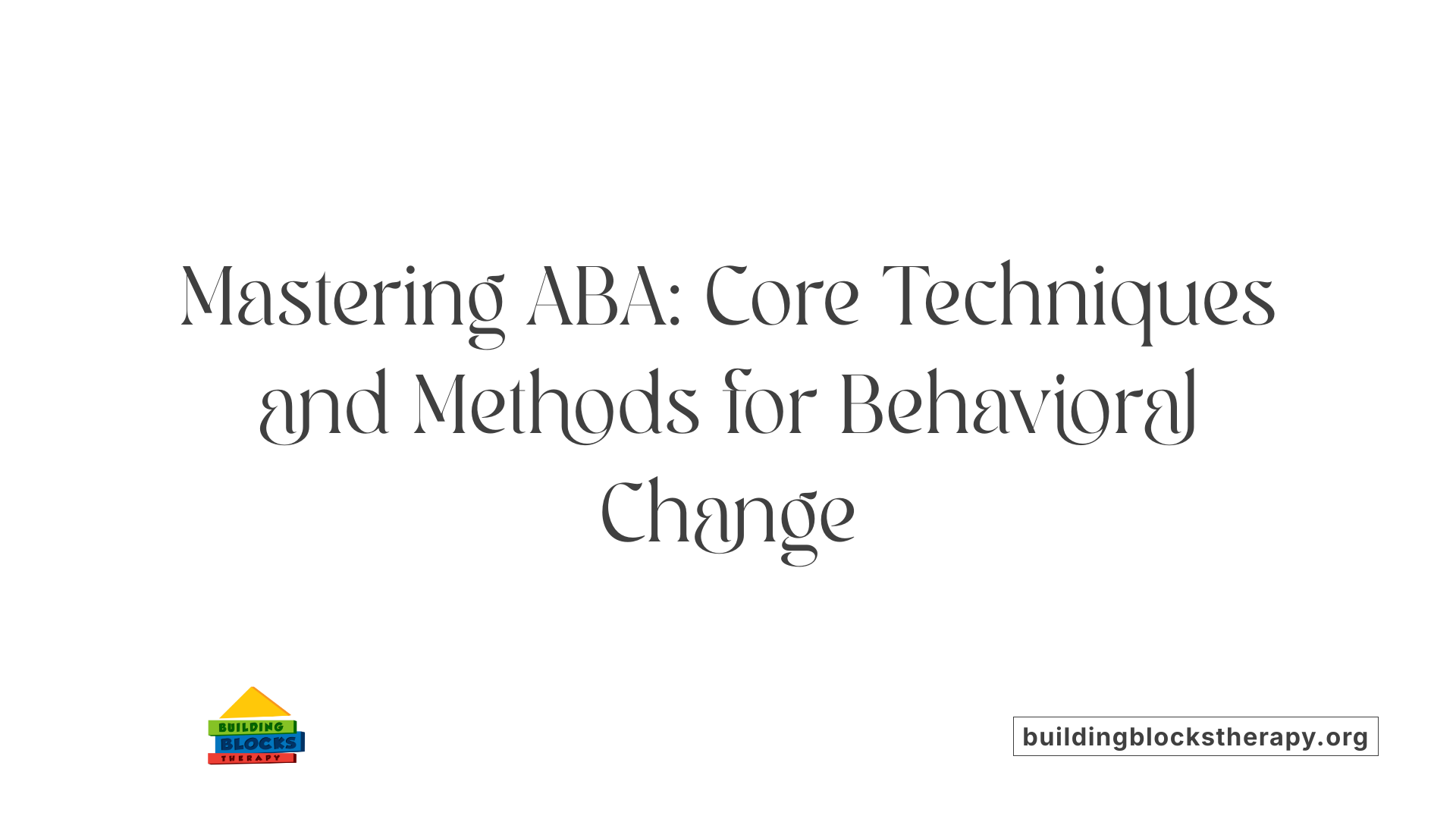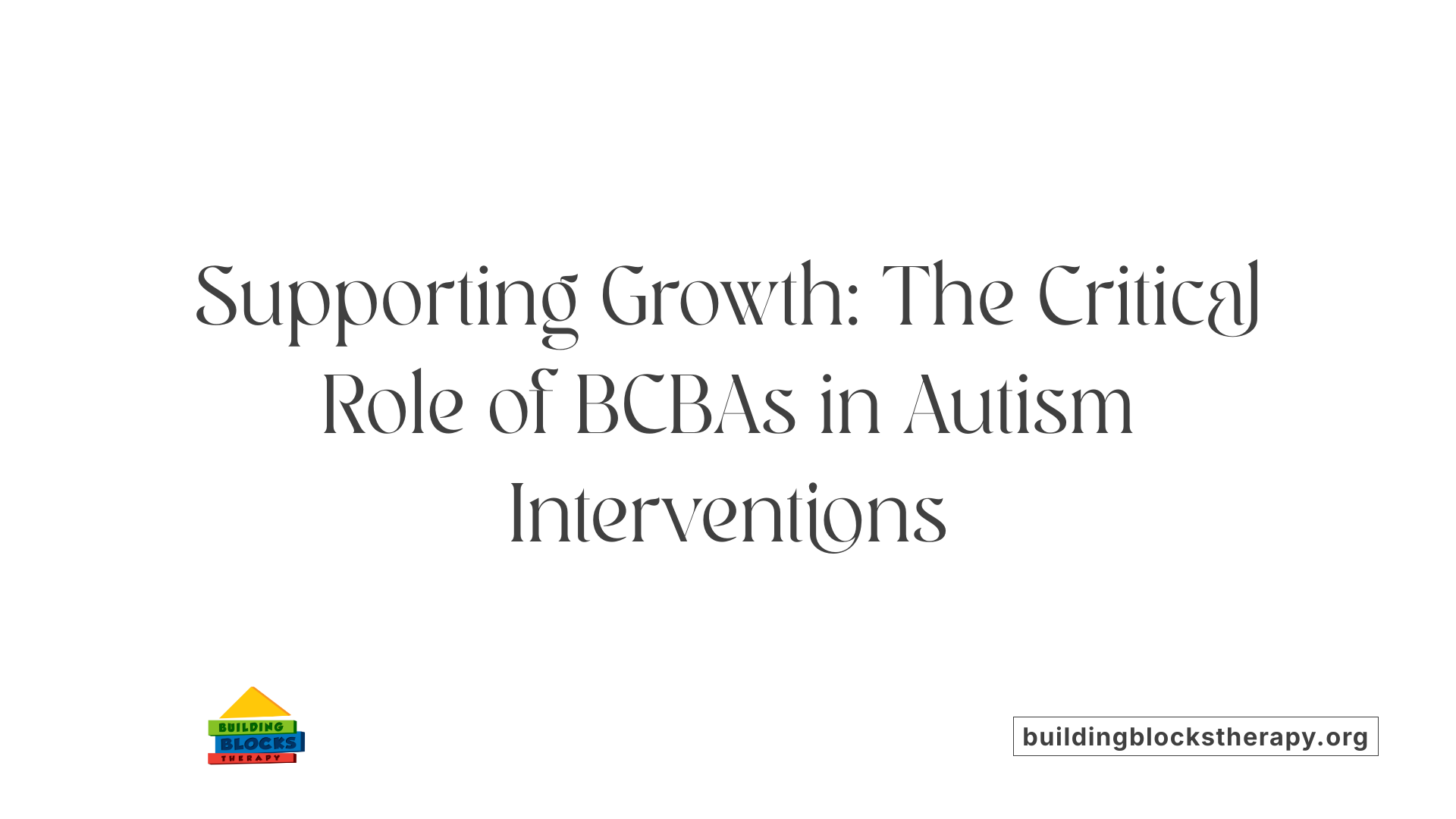Understanding the Role and Impact of BCBAs
Board Certified Behavior Analysts (BCBAs) play a crucial role in supporting individuals with developmental disorders, especially autism spectrum disorder, through applied behavior analysis (ABA) therapy. These professionals assess behavioral challenges, design tailored interventions, and guide therapy that significantly improves social, communication, and daily living skills. With a growing demand for qualified BCBAs across various settings, this career offers rewards both professionally and personally. This article guides aspiring professionals through the necessary steps, qualifications, and the nature of ABA therapy to become a certified BCBA.
The Foundation: Educational Requirements and Coursework

Graduate Degree Requirements
To become a Board Certified Behavior Analyst (BCBA), candidates must earn a graduate degree in behavior analysis or related fields such as psychology, education, or a behavioral science. This advanced degree is essential and serves as the cornerstone of BCBA certification.
Relevant Fields of Study
Typical fields of study include behavior analysis, psychology, education, and other related disciplines focused on understanding and modifying human behavior. This academic background equips professionals to apply applied behavior analysis (ABA) techniques effectively.
Coursework Specifics
Accredited programs incorporate approximately 270 hours of graduate-level coursework aligned with BACB requirements. Coursework covers experimental design, behavior-change procedures, ethics, assessment methods, and intervention strategies. These courses blend theoretical understanding with practical application, preparing students for supervised fieldwork and eventual certification.
Accreditation and Standards
Educational programs must meet standards verified by organizations such as the Association of Behavior Analysis International (ABAI). This accreditation ensures coursework quality and alignment with the Behavior Analyst Certification Board's (BACB) guidelines. Graduates of these programs are eligible to apply for the BCBA certification exam.
What qualifications do professionals offering ABA therapy typically have?
ABA therapy is delivered by credentialed professionals like BCBAs, who hold graduate degrees and certifications earned after rigorous coursework, supervised experience, and passing a BACB-administered exam. Registered Behavior Technicians (RBTs) provide therapy under BCBA supervision and complete specialized training. Together, these professionals ensure ethical, evidence-based ABA therapy tailored to individual needs.
Supervised Fieldwork: Gaining Practical Experience

What are the fieldwork hour requirements for BCBA certification?
To qualify for BCBA certification, candidates must complete either 2,000 hours of supervised fieldwork or 1,500 hours of concentrated supervised fieldwork. This supervised practical experience is critical for applying theoretical knowledge in real-world settings and preparing for independent professional practice.
What supervision standards must candidates meet?
Supervised fieldwork must be conducted under the direct oversight of a certified BCBA. This supervision ensures that candidates receive guidance, feedback, and adhere to ethical and professional standards consistent with those outlined by the Behavior Analyst Certification Board (BACB).
What types of supervised experience are involved?
Candidates engage in applied behavior analysis services across various settings including healthcare, education, private practices, and social services. Experiences typically involve assessment, behavior intervention planning, implementation of ABA techniques like task analysis, chaining, prompting, and reinforcement. This practical exposure helps candidates hone skills essential for working with individuals with developmental or behavioral challenges.
How does the documentation process work for certification?
Candidates must meticulously document their supervised fieldwork hours and activities as part of their application through the BACB. This includes verification by the supervising BCBA and submission of all required forms and evidence. Successful documentation combined with passing the certification exam leads to eligibility for BCBA credentialing.
What qualifications do professionals offering ABA therapy typically have?
ABA therapy is delivered by licensed professionals such as BCBAs, who possess graduate-level certifications and have completed rigorous supervised fieldwork. Registered Behavior Technicians (RBTs) assist in therapy under BCBA direction. Together, they ensure delivery of quality, evidence-based interventions tailored to individual needs, maintaining high ethical and professional standards.
Certification Exam and Licensing Requirements

What is the role of the Behavior Analyst Certification Board (BACB)?
The Behavior Analyst Certification Board (BACB) administers the BCBA certification process, overseeing exam administration, ethical standards, and practice guidelines. It ensures candidates meet education, supervised experience, and competency requirements before certification.
What does the BCBA examination involve?
The BCBA exam is comprehensive, featuring approximately 160–185 questions covering areas such as experimental design, behavior-change procedures, and basic behavior analysis skills. Candidates have four hours to complete the exam. Passing this rigorous exam is required to become a certified BCBA.
How is the application and documentation process managed?
Applicants must submit an online application documenting their graduate coursework, which includes at least 270 hours of BACB-verified content, along with supervised fieldwork hours—either 2,000 hours of general supervised experience or 1,500 hours of concentrated supervised practice. Documentation is reviewed by the BACB before candidates are approved to sit for the exam.
What are the state licensure requirements for BCBAs?
After successfully passing the BCBA exam, candidates are generally required to obtain state licensure to practice professionally. Licensure requirements vary by state but typically include holding a valid BCBA certification and adhering to local regulatory standards.
How do BCBAs maintain their certification?
Certified BCBAs must recertify every two years by completing 32 continuing education units (CEUs) and adhering to the BACB's ethical guidelines. This ongoing education ensures practitioners stay current with best practices and maintain high standards of professional conduct.
Applied Behavior Analysis (ABA): Core Therapy and Techniques

What is Applied Behavior Analysis (ABA) therapy and how is it used to support individuals with autism?
Applied Behavior Analysis (ABA) therapy is a scientifically grounded approach focused on improving meaningful behaviors in individuals with autism spectrum disorder (ASD). It relies on learning principles such as positive reinforcement to encourage desirable behaviors while reducing harmful or challenging ones. A Board Certified Behavior Analyst (BCBA) starts with a detailed assessment of the individual's strengths and needs, which informs the creation of a tailored treatment plan. This plan targets skills like communication, social interaction, self-care, and academic tasks.
ABA therapy uses both structured and naturalistic methods adapted to each person's preferences and daily life. Structured methods like Discrete Trial Training (DTT) provide highly organized learning opportunities, while naturalistic approaches, such as Pivotal Response Treatment, embed learning within play or everyday activities. Intervention is usually intensive and long-term, often engaging family members to help transfer skills across environments. ABA is widely recognized as an evidence-based practice that significantly enhances behavior and developmental outcomes for individuals with autism.
What are the common methods and techniques used in ABA therapy for behavioral analysis?
ABA therapy incorporates multiple techniques to analyze and modify behavior effectively. Some of the primary methods include:
- Discrete Trial Training (DTT): Teaches specific skills through a series of repeated, structured trials.
- Natural Environment Teaching (NET): Encourages learning through natural interactions and typical routines.
- Modeling: Demonstrating desired behaviors for the individual to imitate.
- Prompting and Fading: Providing assistance that is gradually reduced as independence grows.
- Behavior Chaining: Breaking down complex tasks into smaller, manageable steps taught sequentially.
- Reinforcement: Using positive stimuli (like praise or rewards) or negative stimuli to strengthen desired behaviors.
Additional techniques include behavior contracting, extinction (removal of reinforcement for unwanted behaviors), redirection to more appropriate activities, and script fading to improve communication and social interaction. Data collection is ongoing to monitor progress and adjust interventions. These flexible, evidence-based strategies enable BCBAs to support meaningful behavior change tailored to each individual's needs.
The Role of BCBAs in Supporting Individuals with Autism

BCBA Responsibilities and Settings of Practice
Board Certified Behavior Analysts (BCBAs) specialize in assessing and addressing behavioral challenges, notably among individuals with autism and developmental disorders. They apply applied behavior analysis (ABA) techniques to improve adaptive functioning and enhance daily living skills. BCBAs operate across various environments, including healthcare facilities, schools, social service agencies, private practices, and even clients' homes. Their roles encompass direct therapy provision, consulting with families and educators, training caregivers, and supervising other professionals involved in ABA services.
Improving Social and Communication Skills
ABA therapy, as led by BCBAs, plays a crucial role in developing social and communication abilities in those with autism. Using evidence-based approaches such as positive reinforcement, modeling, and structured interventions like Discrete Trial Training and Natural Environment Training, BCBAs tailor programs to individual needs. Through teaching expressive language (communicating thoughts and feelings) and receptive language (understanding instructions and social cues), BCBAs foster essential skills like initiating interactions, turn-taking, and emotional recognition. Visual aids, social stories, role-playing, and peer-mediated techniques further support these learning goals. By consistently reinforcing desirable behaviors and providing naturalistic practice opportunities, ABA under BCBA guidance cultivates meaningful social connections and enhances effective communication.
Impact on Individuals with Autism and Developmental Disorders
The intervention and support provided by BCBAs substantially improve the quality of life of individuals with autism. Their evidence-based techniques help reduce behavioral challenges while promoting positive social engagement and independence. By customizing treatment plans, BCBAs address each person's unique strengths and difficulties, facilitating improvements in functional skills, emotional regulation, and learning. In doing so, they empower individuals and their families to achieve long-term gains in education, social participation, and overall well-being.
| Aspect | BCBA Role | Impact on Individuals |
|---|---|---|
| Settings | Healthcare, education, private homes, and social services | Accessible, multidisciplinary support environments |
| Techniques | ABA interventions, positive reinforcement, modeling | Tailored skill-building for social and communication domains |
| Therapeutic Focus | Communication, social skills, behavior modification | Improved social interactions and adaptive functioning |
| Collaboration | Family members, educators, healthcare professionals | Enhanced holistic care and consistent practices |
By integrating scientific principles with compassionate care, BCBAs play an indispensable role in transforming the lives of those on the autism spectrum and other developmental challenges.
Challenges and Considerations in ABA Therapy
What are some challenges or criticisms associated with ABA therapy for autism?
Applied Behavior Analysis (ABA) therapy, while widely used and effective for many individuals with autism, faces several challenges and criticisms. One major concern is that its highly structured and intense approach can cause emotional distress. Some individuals report that the therapy encourages masking of autistic behaviors, which may contribute to long-term mental health issues such as burnout, identity confusion, and trauma.
Critics also argue that ABA often focuses heavily on modifying behaviors to conform to neurotypical standards rather than promoting acceptance of neurodiversity. This can lead to discouraging natural and harmless behaviors, like stimming, which are important for self-regulation and identity.
There are also ethical concerns regarding the use of reinforcement techniques. Some feel these strategies might be punitive or aversive, potentially impacting emotional wellbeing. This has led to a wider debate about prioritizing conformity over individual preferences and natural behaviors.
Importance of ethical guidelines and ongoing education
Given these challenges, ethical guidelines are crucial in ABA practice. The Behavior Analyst Certification Board (BACB) enforces strict ethical standards to protect the dignity and rights of clients. Ongoing education ensures practitioners stay informed about best practices and emerging concerns.
Continuing professional development helps BCBAs adapt their methods to be more collaborative and respectful of individual needs, reducing potential harm. Emphasizing ethics and continuous learning is essential to maintain trust and effectiveness in ABA therapy.
Emotional and mental health considerations
Addressing the emotional and mental health of individuals receiving ABA therapy is vital. Therapists must balance behavior change goals with support for the individual's emotional wellbeing, ensuring interventions do not cause unwanted stress or harm.
More inclusive approaches that integrate developmental and educational perspectives are gaining traction. These methods focus on acceptance and personalized support rather than solely altering behaviors, aiming to safeguard mental health and promote positive outcomes.
Overall, while ABA therapy remains a valuable tool, awareness of its challenges and adherence to ethical, person-centered practices are imperative for its responsible use.
Becoming a BCBA: A Rewarding Career Path
Becoming a Board Certified Behavior Analyst requires dedication to advanced education, supervised practical experience, and mastery of a rigorous certification exam. BCBAs are integral in delivering evidence-based ABA therapy that fosters essential skills and improves lives, particularly for individuals with autism and developmental challenges. While the field presents complexities and requires a commitment to ethical practice and continuing education, the growing demand and profound impact of the profession offer tremendous opportunities for personal and professional fulfillment. Aspiring BCBAs who are passionate about behavioral science and compassionate care will find this career path both challenging and deeply rewarding.
References
- How to Become a Board Certified Behavior Analyst (BCBA)
- How to Become a Board Certified Behavior Analyst (BCBA)
- Board Certified Behavioral Analyst (BCBA) Career Overview
- How to Become a Board-Certified Behavior Analyst (BCBA)
- How to Become a BCBA | Requirements and Certifications
- Board Certified Behavior Analysts (BCBA)
- Applied Behavior Analysis (ABA)






